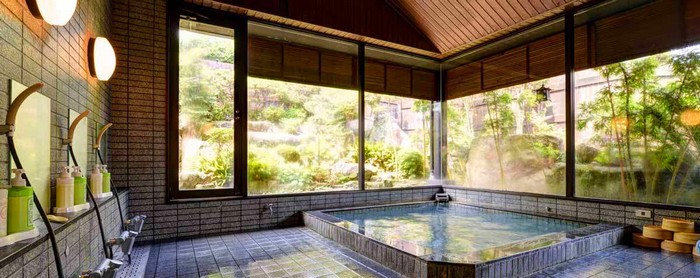| Indications and Contraindications based on the Water Quality of Medical Spring Categories | |
|---|---|
| Water quality | Simple weak-radioactive hot spring |
| Mineral spring category | Hypotonic alkalescent low-temperature hot spring |
| Contraindications for bathing | Acute diseases (especially diseases accompanied by fever), active tuberculosis, malignant tumors, serious heart diseases, respiratory failure, renal failure, hemorrhagic diseases, advanced anemia, other general progressive diseases, pregnancy (especially first and last trimesters) ※The term “contraindications” refers to diseases and conditions that present the risk of adverse physical affects even after bathing in or drinking hot spring water only once. |
| Indications for bathing | Neuralgia, muscular pain, joint pain, stiff shoulders, motor paralysis, stiff joints, bruises, sprains, chronic digestive disorders, hemorrhoids, excessive sensitivity to cold, convalescence after illness, recovery from exhaustion, promotion of health, gout, arteriosclerosis, high blood pressure, chronic cholecystitis, gallstones, chronic dermatitis, chronic female disorders ※The term “indications” refers to conditions that may benefit from hot spring recuperation. |
| Contraindications for drinking | None |
| Indications for drinking | Gout, chronic digestive disorders, chronic cholecystitis, gallstones, neuralgia, joint pain(※Drinking hot spring water in the bathing area is not allowed.) |
Precautions to be observed when bathing
- Persons beginning hot spring recuperation should bathe no more than 2 or 3 times a day for the first few days.
- Generally, 2 or 3 weeks is required for hot-spring recuperation.
- Dizziness (reaction) caused by prolonged bathing may be noted about 3 days to I week after beginning hot-spring recuperation. Persons experiencing this symptom should reduce the number of times they bathe a day or discontinue bathing until the symptom disappears.
- Although bathing time differs depending on the temperature of the water, 3 – 10 minutes is advised initially, which may be prolonged as the bather becomes more accustomed to the water.
- With the exception of exercise bathing, bathers should rest quietly while bathing.
- After bathing, hot spring constituents should not be rinsed from the body with water (Conversely, persons prone to skin inflammation caused by hot spring should rinse with fresh water immediately after bathing and wipe off any hot spring water constituents.)
- After bathing, bathers should rest quietly for a while being careful not to catch a chill.
- As a rule, persons with advanced arteriosclerosis, high blood pressure or heart disease should not bathe in excessively hot water (42 degrees or more).
- Care must be taken not to enter a hot bath too quickly since doing so may cause symptoms such as dizziness.
- Bathing should preferably be avoided immediately before or after a meal.
- Special care must be taken when bathing after imbibing alcoholic beverages.



